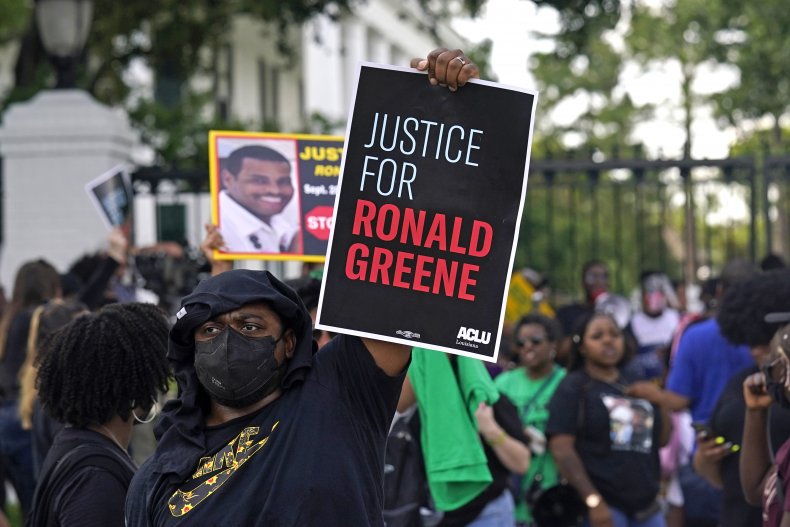New Autopsy Rejects Troopers' Claim That Black Man Died in Crash, Shows Other Factors
A second look at an autopsy has shown that the 2019 death of Ronald Greene was not caused by injuries related to a car crash.
According to the Associated Press, a new forensic review of the case ordered by the FBI has shown that the Louisiana State Police withheld critical information from the coroner. Greene's death is now attributed to several factors, all of which were not related to the police's original explanation of a car crash.
The review also addressed that a failed airbag deployment did not cause Greene's fractured breastbone and ruptured aorta. Instead, an anonymous person familiar with the review told AP that CPR attempts likely caused the injuries.
Mona Hardin, Greene's mother, told AP that she hopes the new report shines new light on the case.
"This thing has been so crazy," she said after revealing she had yet to bury his cremated remains. "No one has properly grieved."
Federal prosecutors are in the final stages of a civil rights investigation involving the beatings of other Black motorists. The new revelations could make the idea of charges made against the police officers involved more likely.
The Louisiana State Police and the U.S. Justice Department have not responded to requests for comment.
For more reporting from the Associated Press, see below.

The unusual second look at what killed Greene confirmed what his family suspected the moment they saw his bruised and battered corpse and his car with only slight damage: A minor crash at the end of a high-speed chase had nothing to do with his death.
The FBI this week received the new forensic review it commissioned in light of the long-buried body camera footage, vehicle black box data and other evidence the state police withheld from Greene's original autopsy.
Still unclear was whether the new autopsy would prompt the Union Parish coroner to change the manner of Greene's death from accidental to homicide, which could affect the charges available to state and federal prosecutors.
Rafael Goyeneche, a former prosecutor who heads the Metropolitan Crime Commission, a New Orleans-based watchdog group, said the new cause of death makes it even more likely prosecutors will bring serious charges.
"This yanks the rug from under the defense claim that the accident caused his death and that the beatings weren't that severe," he said.
Green's May 10, 2019, death came after he failed to stop for a traffic violation and led troopers on a midnight chase across northern Louisiana at speeds topping 115 mph (185 km/h), ending along a rural roadside near Monroe. State police initially told Greene's family he died after crashing into a tree, an account the Union Parish coroner committed to writing in an official report, which describes Greene's death as a motor vehicle accident and makes no mention of a confrontation with troopers.
After officials refused for more than two years to release the troopers' body camera video, the AP obtained and published it this spring, showing white troopers converging on Greene before he can even get out of his car, repeatedly stunning and punching him as he appears to surrender and repeatedly wails, "I'm your brother! I'm scared! I'm scared!"
A trooper can later be seen dragging the heavyset Greene by his ankle shackles and he is left prone and face down in the dirt for more than nine minutes before he eventually goes limp.
Yet even after AP published video of Greene's violent arrest, state officials and advocates for the troopers repeated the crash theory, with Governor John Bel Edwards floating it as recently as September.
"The issue would be did he die from injuries sustained in the accident?" Edwards, a Democrat, said on a radio program. "Obviously, he didn't die in the accident itself because he was still alive when the troopers were engaging with him. But what was the cause of death? I don't know that that was falsely portrayed."
Edwards went on to say troopers' actions were "criminal" but that whether they caused Greene's death was the subject of an investigation and "I'm not going to get in front of that."
A lawyer for the troopers involved in Greene's arrest told a court in July that the crash killed him.
"At trial, defendants will present scientific evidence that Mr. Greene's death was caused by a crash-related blunt force chest trauma resulting in a fractured sternum and ruptured aorta," P. Scott Wolleson wrote in a filing in a civil lawsuit brought by Greene's family.
Greene's was among a dozen cases over the past decade in which an AP investigation found troopers or their bosses ignored or concealed evidence of beatings, deflected blame, and impeded efforts to root out misconduct. Dozens of current and former troopers said they occurred in an agency with a culture of impunity, nepotism and, in some cases, outright racism.
Federal investigators are also examining the actions of police commanders, which included pressuring their own detectives to hold off on arresting the trooper who acknowledged hitting Greene in the head with a flashlight and was overheard on his body camera video boasting to a colleague that he "beat the ever-living f--- out of him."
That trooper, Chris Hollingsworth, died last year in a single-vehicle crash hours after he learned he would be fired for his role in the Greene case.
Speaking to investigators shortly before his death, Hollingsworth sought to justify his flashlight strikes on Greene in part because the man "didn't have any apparent injuries" after the crash and "could have done anything once my hold was broke off him."

